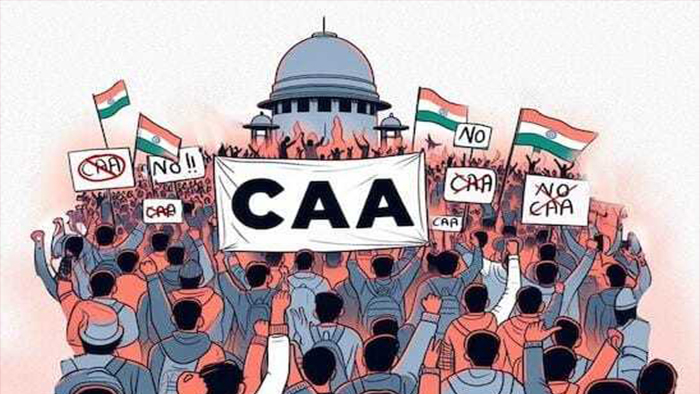Analyzing the Legal Battle Over the Citizenship Amendment Act (CAA)

The ongoing legal battle surrounding the Citizenship Amendment Act (CAA) in India has sparked debates and controversies, raising crucial questions about citizenship, equality, and constitutional rights. Let’s delve into the latest developments in the Supreme Court’s proceedings regarding the CAA and examine the broader implications of this contentious legislation.
The recent hearing in the Supreme Court saw the Centre seeking time to respond to petitions challenging the implementation of the CAA. Solicitor General Tushar Mehta, representing the Centre, reiterated that the CAA does not strip anyone of their citizenship rights. However, the court granted the Centre three weeks to file its reply, setting the next hearing for April 9. This delay underscores the complexity of the legal arguments and the significance of the issues at stake.
The petitions before the court, numbering more than 200, seek a stay on the implementation of the CAA and the associated Citizenship Amendment Rules 2024. These petitions highlight concerns about the discriminatory nature of the law, particularly its exclusionary impact on Muslims. Critics argue that the CAA violates the fundamental right to equality enshrined in Article 14 of the Indian Constitution by singling out individuals based on their religion.
Several prominent figures and organizations, including political leaders, NGOs, and student groups, have joined the legal battle against the CAA. Their collective efforts reflect a broader societal concern about the implications of the legislation for India’s secular fabric and democratic principles. The diverse array of petitioners underscores the widespread opposition to the CAA across different segments of society.
The legal challenges to the CAA also extend to its implementation rules, with petitioners contesting the procedural aspects of how the law was enacted. Kerala, as the first state to challenge the CAA in 2020, has been at the forefront of legal opposition, arguing that the law undermines the constitutional guarantee of equality. The state’s additional challenge to the CAA rules further underscores its commitment to upholding constitutional values.
AIMIM chief Asaduddin Owaisi has raised concerns about the potential misuse of the CAA to target the Muslim community, particularly in conjunction with the National Register of Citizens (NRC). His plea to the Supreme Court emphasizes the broader implications of the CAA for minority rights and religious freedom in India. These concerns echo broader anxieties about the marginalization of vulnerable communities and the erosion of democratic norms.
The Centre’s stance on the CAA remains steadfast, with officials maintaining that the law upholds constitutional principles and does not infringe on the rights of any citizen. Despite the government’s assurances, the legal battle over the CAA continues to unfold in the courts, reflecting deep-seated divisions within Indian society and raising questions about the future trajectory of citizenship laws in the country.
As the Supreme Court prepares to delve deeper into the legal complexities surrounding the CAA, the outcome of this legal battle will have far-reaching implications for India’s democratic fabric and social cohesion. The court’s deliberations will be closely watched by citizens, activists, and observers alike, underscoring the significance of this landmark case in shaping India’s constitutional destiny.
In conclusion, the legal battle over the CAA represents a critical juncture in India’s democratic journey, where foundational principles of equality, justice, and religious freedom are put to the test. The Supreme Court’s role as the guardian of constitutional values will be pivotal in resolving the complex legal and moral dilemmas posed by the CAA, reaffirming India’s commitment to its democratic ideals.
By : Kruthiga V S
—–
#CAA #SupremeCourt #LegalBattle #Citizenship #ConstitutionalRights #Equality #ReligiousFreedom #IndianDemocracy #LegalProceedings #SocialJustice #PublicPolicy #ConstitutionalValues #CurrentAffairs #LegalAnalysis #IndianPolitics


